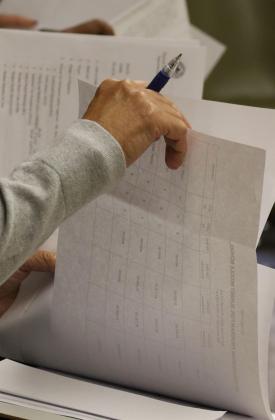
Steve Bandy /Crowley Post-Signal
Acadia Parish officials now have the authority to enter private property to determine whether or not a structure on that property is derelict.
Parish police jurors have amended the Acadia Derelict Buildings Ordinance to give any inspector who has contracted with the parish to inspect buildings the authority to enter any property upon which a building is erected and perform an inspection to determine if the building meets the definition of a derelict structure.
The current police jury, which in January began its second year in office, has targeted abandoned and derelict buildings. That effort, however, has been stymied by the lack of any “real authority” for inspectors to enter private property, Ashley LeBlanc, director of the Acadia Parish Office of Homeland Security and Emergency Preparedness, told jurors early in their term. LeBlanc also heads up the parish permitting office.
As a first step to condemning private property, the jury previously adopted a notification protocol.
“The letters are working,” LeBlanc told jurors at their February meeting. “People are tearing down some of these buildings without us having to go in and do it. But if they don’t, now we have the legal authority to access the property.”
At their recent meeting, jurors also approved “grandfathering in” unapproved sewer systems for buildings exiting prior to Jan. 1, 1990, in the unincorporated areas of the parish.
The new regulation stipulates that, should the ownership of the property – house or land – change ownership and/or the structure is remodeled, altered or relocated, the sewer system must be brought up to code.
Change of ownership by way of succession or act of donation to “immediate family” will be exempt from the upgrade requirement.
LeBlanc explained to jurors in January that state sanitarians had pointed out that parish ordinance contained no such “grandfather” clause or exemption.
In other action involving LeBlanc’s office, jurors agreed to appoint a three- or four-member committee to assist with securing property and building drafts for a new OHSEP headquarters.
LeBlanc said the parish has been awarded grant funding from FEMA, but the deadline to use the funding is approaching. Also, additional grants are available, but time is of the essence.
OHSEP currently shares office space with the Emergency 911 Communications Building on Court Circle. The parish owns property, both inside and outside the Crowley city limits, upon which a new building might be constructed. Other properties are also being considered.
Jurors also approved the appointment of a three- or four-member airport committee on a volunteer basis in an advisory capacity. That committee would serve with a representative from the Police Jury Administrative Office.
No appointments were announced for either of those committees.
Jurors also approved the holding of an election in Fire Protection District No. 7 – Mire area – to authorize the levy of parcel fees to support the volunteer fire department.
Two propositions will appear on the April 24 ballot. The first is a renewal of the existing $50 fee on each lot, subdivided portion of ground or individual tract upon which a structure in located. That fee generates an estimated $96,100 annually for the department.
The second proposition would add a $25 parcel fee, generating an additional $48,050 annually.
Both are for terms of 12 years. The $50 fee begins in 2022; the $25 fee in 2021.
In other action, jurors:
• Reappointed Gene Simon and April Simon to the Fire Protection District No. 3 board (Evangeline area);
• Appointed Jennifer Autin, executive director of the Rayne Chamber of Commerce, to the Acadia Parish Tourist Commission;
• Reappointed Rep. John Stefanski to the Acadiana Area Human Services District Board, retro-active to April, 2019; and
• Appointed Daniel Thomas to the Bayou Plaquemine Drainage Board, replacing James Wilridge, who resigned.
